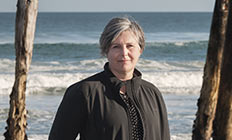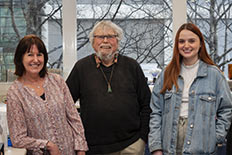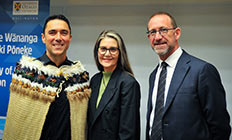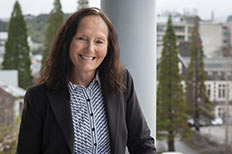Feature
InBrief
Domesticated animals map social change

Dr Karen Greig: “Our understanding of the role of animals in the development of these networks has been limited.”
Biomolecular techniques are being used to study the bones of domesticated animals from across the Western Pacific to show how social networks have changed over time.
Co-director of Southern Pacific Archaeological Research Dr Karen Greig explains that domesticated animals, particularly pigs, have been important to communities across the Western Pacific since their introduction around 4,000 years ago.
“Their use as a food item was often secondary to their role in social interactions, where status and wealth could be obtained through the exchange of valuables. But our understanding of the role of animals in the development of these networks has been limited,” Greig says.
Archaeological research has typically focused on tracing objects such as stone tools, pottery and shell valuables. “What is missing is consideration of the role of pigs, dogs and chickens in these networks. This is critical – without it, we lack a complete picture of how the networks functioned and changed.”
Studying animal bones is challenging: they are fragile and often highly fragmented and difficult to identify.
Now, with the support of a Marsden Fast Start Grant and new biomolecular techniques, Greig and her team can determine the species and age bones. Further, the chemical signatures in animals' tooth enamel shows if they were moved between regions during their lifetime.
This will help researchers trace the patterns of trade and husbandry of domestic animals, mirroring the interactions and movements of people throughout the Western Pacific, and contributing to the wider story of human-animal relationships and their place in human societies from the past to the present.
Heart health

Dr Allamanda Faatoese: she has been awarded an HRC Pacific Project grant for a research study titled “Are all tests created equal?”.
Pasifika peoples stand to benefit from research on the measurement of a blood marker of heart health.
Dr Allamanda Faatoese, from the University of Otago's Christchurch Heart Institute, has been awarded a Pacific Project Grant from the Health Research Council to lead the research, after she and her colleagues identified a potential anomaly for Pasifika in the measurement of the marker, called NT-proBNP.
Faatoese explains that, when they studied 300 people with healthy hearts, the levels of the blood marker in Pasifika were only half those observed in European New Zealanders.
In a research project entitled “Are all tests created equal?”, the researchers will use the $1.1 million grant to investigate whether similar observations occur in patients with heart failure, and whether any disparities result from differences in detection or whether it is an ethnic difference.
Faatoese notes that this blood marker has been proposed as part of cardiovascular screening tests in the community to detect those at risk of heart failure.
She says that, if levels of NT-proBNP are inherently low in Pasifika, the reference ranges might need to be adjusted to be relevant for Pasifika in New Zealand and in the Pacific region.
Faatoese, who specialises in cardiovascular risk among Māori and Pasifika communities, is joined in the three-year research project by Andree Person, Dr Lynley Lewis, Professor Vicky Cameron, Professor Mark Richards, Dr Anna Pilbrow, Professor Chris Pemberton, Jaye Moors, Zoe Ward, Professor Richard Troughton and Professor Robert Doughty.
COVID fatigue

Senior technician Tina Edgar, Professor Warren Tate and Dr Anna Brooks: They are comparing the molecular profiles of long-hauler COVID-19 patients with those of ME/CFS patients and a control group.
Ground-breaking research on Chronic Fatigue Syndrome could be the key to understanding the causes of long-term fatigue in some people affected by COVID-19.
Last year, a team led by Emeritus Professor Warren Tate (Biochemistry) proved once and for all that Myalgic Encephalomyelitis (ME) or Chronic Fatigue Syndrome (CFS) is not all inside people's heads, but has a real biological basis in molecular changes in the immune cells of patients.
Tate and colleagues are now turning their attention to so-called “long hauler” COVID-19 patients, who show prolonged debilitating symptoms long after the expected recovery time to normal health.
Tate says that many of the symptoms reported by these COVID-19 patients, particularly the persistent fatigue and “brain fog”, are characteristic of ME/CFS that often arise after infectious disease outbreaks such as glandular fever.
The researchers are comparing the molecular profiles of long-hauler COVID-19 patients with those of ME/CFS patients and a control group, to see whether they are one and the same disease or, at least, closely related.
Tate says the immediate aim is to suggest potential therapeutic interventions that might mitigate the severity of both conditions, but the ultimate goal is to find strategies to reverse what are lifelong global illnesses affecting millions of people.
The COVID-19 research team comprises Tate, senior technician Tina Edgar (Biochemistry), Dr Torsten Kleffmann (Centre for Protein Research), Associate Professor Aniruddha Chatterjee (Pathology), postgraduate student Anna Blair (Biochemistry), and immunologist Dr Anna Brooks from the University of Auckland.
New frontier of justice

Dr Bridgette Toy-Cronin: “The design of an online court form sounds like a simple exercise but, in fact, raises difficult and important issues about access to justice and the role of the courts.”
The COVID-19 pandemic has advanced the introduction of online court programmes around the world. They help protect public health – and offer a more modern, cost-effective, efficient and accessible court system, reducing the barriers to justice for many.
However, co-director of the Otago Centre for Law and Society Dr Bridgette Toy-Cronin says it is essential that care is taken with the design of online filing systems if online courts are to be accessible without a lawyer.
“Without well-designed forms the public will not be able to effectively engage or coherently tell their story to the court, and the promises of online courts will be lost.”
She says that while online filing offers significant benefits to all stakeholders, the systems need to be designed with a deep understanding of the users.
A report co-funded by Otago and the New Zealand Law Foundation, and co-written with academics from the University of Waikato cautions against making all forms “digital by default”, arguing for off-line alternatives for those who are digitally excluded. It also raises the issue of “nudging” that alters user behaviour, and the need to prompt users to provide the detail a legal narrative requires.
“The design of an online court form sounds like a simple exercise but, in fact, raises difficult and important issues about access to justice and the role of the courts,” Toy-Cronin says.
“With the safeguards of a strong user-focus and judicial engagement, online court forms could provide greater access for many disputants, and better data about our justice system to support ongoing design improvements and cost savings for government.”
When cancer and diabetes coincide

Dr Jason Gurney with HRC Chief Executive Professor Sunny Collings and the Minister of Health Hon Andrew Little.
When Dr Jason Gurney (Ngāpuhi) began his career as a researcher, it was to investigate diabetes-related foot problems for Māori.
The research brought him face-to-face with the appalling toll diabetes was having on tangata whenua and it was then that he decided to dedicate his career to Māori health.
Now the epidemiologist and director of the Cancer and Chronic Conditions (C3) research group at the University of Otago, Wellington, is turning his attention to the co-occurrence of diabetes and cancer in Māori with the aid of a two-year $800,000 Health Research Council (HRC) project grant.
The latest statistics show diabetes cases are increasing by seven per cent a year and are three times higher among Māori and Pacific people. At the same time, there is a rise in potential cancer cases, with recent projections indicating a doubling of cancer patients over the age of 65 by 2035.
Gurney says the research will help identify parts of the cancer pathway where Māori and Pacific patients with diabetes may not be accessing best-practice care.
“We will examine what the impact of diabetes is on access to early diagnosis, cancer care and health outcomes among patients who have diabetes and cancer.”
The research will be conducted by the C3 research group in association with researchers at the University of Waikato led by Professor of Population Health Ross Lawrenson.
The research funding was announced by the Minister of Health Hon. Andrew Little and HRC Chief Executive and former UOW Dean Professor Sunny Collings in July.
Depression faces sniff test

Dr Mei Peng: “Patients with postpartum depression show normal olfactory sensitivity whereas patients with major depression show substantially declined olfactory sensitivity.”
An Otago study has identified a link between olfactory function and postpartum depression.
Lead author Dr Mei Peng (Food Science) says the world-first study helps show the sensory symptoms related to postpartum depression are very different from those of major depression.
“Specifically, patients with postpartum depression show normal olfactory sensitivity whereas patients with major depression show substantially declined olfactory sensitivity.”
The findings add evidence to the growing argument postpartum depression is different to major depression, and requires separate research and medical attention.
“Postpartum depression has been long regarded as a sub-category of major depressive disorder, but with a poor diagnostic rate. Recently, the scientific community has been questioning whether postpartum depression should be studied and treated separately from major depression following insights into the different effect each disorder has on neurobiology.”
Pregnancy-related depression is common, with six to 12 per cent of women affected during pregnancy, and more than 20 per cent affected after having a baby. Resolving the status of postpartum depression may have important implications for diagnosis, treatment, policy and research of the disorder.
The multidisciplinary study assessed the olfactory abilities of 39 depressed mothers who were pregnant and up to one-year post pregnancy, comparing them against a healthy cohort.
The researchers found no difference between the two groups in terms of their ability to detect smells, but postpartum depressed women experienced different intensity and hedonic perception of some smells.
“These findings imply that postpartum depression is associated with alterations in higher-order olfactory perception, but not early-processing of odours,” Peng says.
Education pathways for refugees

Associate Professor Vivienne Anderson: “While refugee-background students are diverse, our research is highlighting the intense emotional and academic labour involved in navigating New Zealand education…”
College of Education staff are leading a research project with former refugees from Dunedin and Invercargill secondary schools to explore tertiary education pathways in Aotearoa New Zealand.
Project leader Associate Professor Vivienne Anderson says 37 students have joined the Secondary to Transitions Project since it began in April 2020.
The Invercargill-based students are Colombian, speaking Spanish as their first language; the Dunedin students are Syrian, Palestinian and Afghani, speaking Arabic or Dari/Farsi as their first language.
They participate in four workshops each year, held during school holidays, with content planned in collaboration with the students.
Anderson says the project offers students a space to reflect on their education aspirations, learn about education pathways in New Zealand, ask questions and access information, and become familiar with tertiary education environments.
In addition, the students are collaborating with the research team to create student-centred resources to inform schools and tertiary education providers' work with refugee-background students.
Research findings have highlighted the importance of schools taking the students' educational aspirations seriously. Some students have expressed frustration at being seen only as English-language learners, or as incapable of academic study. Others have described the pressure of managing schoolwork and language learning alongside caregiving responsibilities and the ongoing effects of trauma.
“While refugee-background students are, like all students, diverse, our research is highlighting the intense emotional and academic labour involved in navigating New Zealand education as a recently-arrived former refugee,” Anderson says. “We hope our project can inform policies and practices that make educational navigation a bit easier for them.”
Financial literacy for retirement

Associate Professor Helen Roberts: “Lack of financial literacy sees many people missing out on the ability to make positive financial decisions…”
Māori, Pacific Islanders and women have lower levels of financial literacy, resulting in them being financially underprepared for their senior years, according to new research.
The study, “Financial Literacy, Debt, Risk Tolerance and Retirement Preparedness: Evidence from New Zealand”, showed people with better education were more financially literate, and more likely to have less debt anxiety and higher risk tolerance.
It supported previous research that found financial literacy is high in New Zealand, with 57 per cent of older people scoring well in testing. However, females aged 55– to 59 and people of Māori or Pacific Island ethnicity with lower educational attainment, lower incomes and high family responsibility had significantly lower levels of financial literacy and were more vulnerable to financial struggles in their senior years.
“Lack of financial literacy sees many people missing out on the ability to make positive financial decisions in their working years, resulting in tougher living conditions in their senior years,” says Associate Professor Helen Roberts who co-authored the study with Associate Professor Ros Whiting and Dr Jelita Noviarini (all Accountancy and Finance) and Dr Andrew Coleman (formerly Economics).
The researchers concluded that, contrary to findings in a previous New Zealand study suggesting heavy reliance on the universal superannuation, financial literacy is important for retirement preparedness and those who suffer most financially in their retirement generally have lower income and more anxiety about their debt levels.
“Provision for better financial literacy can help improve financial health and overall wellbeing through positive decision-making towards retirement planning, savings plans and investments.”

